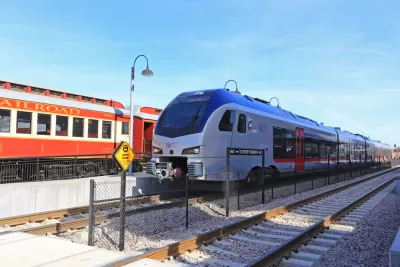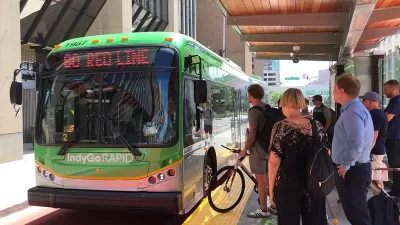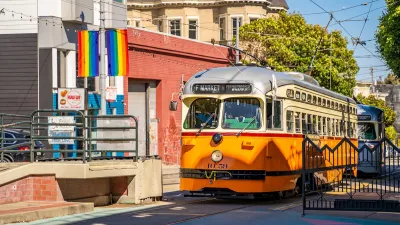The federal government has committed funding to two transit projects in Fort Worth, if local officials can provide matching funding. Fort Worth councilmembers are having trouble parting with the cash.

Gordon Dickson and Luke Ranker report from Fort Worth, where a debate about the future of the city's transportation system is coming down to brass tacks:
Fort Worth city leaders agree that the city needs better passenger trains, buses and other transit services.
But the cost is giving them sticker shock.
The debate is coming after Trinity Metro, the transit agency for the western half of Dallas-Fort Worth, requested $86.1 million from Fort Worth for capital improvements during the coming year.
"Much of the money — about $61.1 million — would be used to extend the TEXRail commuter line about two miles south to the medical district, and the remainder would be needed to build a new bus rapid transit system on the city’s east side," according to the article.
The article details the political debate about the cost of Trinity metro's request, and its value to the city of Fort Worth. For instance, Councilmember Cary Moon is quoted saying, "I think both of these are important,” referring to the TEXRail station and the planned rapid bus line on East Lancaster Avenue. “It’s not worth increasing taxes at this time,” Moon continued.
On the other side of the issue is Jeff Davis, board chairperson for Trinity Metro. “At some point, we have to a make decision in Fort Worth about what we want,” Davis is quoted saying in the article. “Do we want to have better transit and to become a better city, or do we want to continue being a bedroom suburb of Dallas?”
The TEXRail project already has $58.9 million in funding from the federal government in hand, if Trinity Metro can come up with a local match.
The remaining $25 million of the funding request would be used to "to expand rapid bus service that would run along East Lancaster Avenue, from near the city’s downtown area to the historic Handley neighborhood in far east Fort Worth, near Arlington," according to Dickson and Ranker.
FULL STORY: Fort Worth leaders want better buses and trains, but balk at the $86 million cost

Planetizen Federal Action Tracker
A weekly monitor of how Trump’s orders and actions are impacting planners and planning in America.

San Francisco's School District Spent $105M To Build Affordable Housing for Teachers — And That's Just the Beginning
SFUSD joins a growing list of school districts using their land holdings to address housing affordability challenges faced by their own employees.

The Tiny, Adorable $7,000 Car Turning Japan Onto EVs
The single seat Mibot charges from a regular plug as quickly as an iPad, and is about half the price of an average EV.

Seattle's Plan for Adopting Driverless Cars
Equity, safety, accessibility and affordability are front of mind as the city prepares for robotaxis and other autonomous vehicles.

As Trump Phases Out FEMA, Is It Time to Flee the Floodplains?
With less federal funding available for disaster relief efforts, the need to relocate at-risk communities is more urgent than ever.

With Protected Lanes, 460% More People Commute by Bike
For those needing more ammo, more data proving what we already knew is here.
Urban Design for Planners 1: Software Tools
This six-course series explores essential urban design concepts using open source software and equips planners with the tools they need to participate fully in the urban design process.
Planning for Universal Design
Learn the tools for implementing Universal Design in planning regulations.
Smith Gee Studio
City of Charlotte
City of Camden Redevelopment Agency
City of Astoria
Transportation Research & Education Center (TREC) at Portland State University
US High Speed Rail Association
City of Camden Redevelopment Agency
Municipality of Princeton (NJ)




























